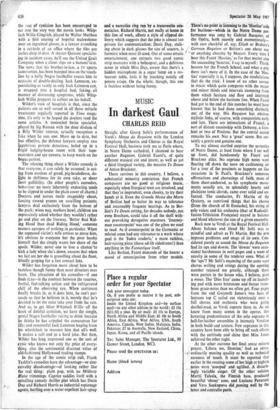In darkest Gaul.
MUSIC CHARLES REID
Straight after Georg Solti's performances of Verdi's Messa da Requiem with the London Symphony Orchestra and Chorus at the Royal Festival Hall, business took me to Paris where, in Notre Dame cathedral, I chanced to hear another Requiem, Gabriel Faure's, of quite different musical cut and intent, as well as yet a third liturgical variety, the massive Te Deum of Anton Bruckner.
There survives in this country, I believe, a substantial minority conviction that French composers are no good at religious music, especially when liturgical texts are involved, and that they're imprudent, even cheeky, to try their hands at it. Even the Grande Messe des Morts of Berlioz had to batter its way to tolerance and reasonably frequent bearings. As to Ber- lioz's Te Deum setting, for decades nobody, not even Beecham, could take it off the shelf with- out provoking derogative murmurs. 'Journey- man counterpoint' was one of the gibes we used to read. As if counterpoint in the Germanic or related sense had any relevance to a work whose goal is the 'Index crederis,' a more ruthless, hair-raising piece (those ad-lib sidedrums I) than anything in the Fantastique itself.
Like Berlioz, Faure demands of the hearer a mood of emancipation from other models.
There's no point in listening to the 'Hostias' solo for baritone--which in the Notre Dame per- formance was sung by Gabriel Bacquier, of the Opera, both suavely and momentously— with ears chockful of, say, Elijah or Brahms's German Requiem or Britten's one about war or anything churchy by Mozart. Every time I hear this Faure 'Hostias,' as for that matter also the succeeding 'Sanctus,' I say to myself : Thank heaven for the French School, and what a pity there isn't more of it. In the case of the `Hos- tias' especially it is, I suppose, the modulations that do the trick. I know of no other savour in music which quite compares with the major and minor thirds and intervals stemming from them which hesitate and flow and intermelt above and below the baritone line. When Faure had got to the end of this number he must have known that he had done something distinctly out of the way. His Requiem has obvious stylistic links, of course, with compatriots early and late. There are intimations of Franck, a sort of distant cousinship with Debussy, a fore- hint or two of Poulenc. But the central accent remains his own. Not a 'great' score. But cer- tainly a gentle and genuine one.
To my almost startled surprise the acoustics of Notre Dame, at least from where I sat well up front, did handsomely by Faure and Bruckner alike. No soprano high notes went floating off down the nave on cushioning air for a tour of the precincts as happens on like occasions in St Paul's. Bruckner's sonorous affirmations and chorusings of faith, most of them sheet-anchored, as his symphonic move- ments usually are, to splendidly hearty and plainjane tonic chords, came over solid and un- fuzzed. The conductor, Fr Martin of the Oratory, so contrived things that his chorus (from the church of St Eustache), his string of solo voices and his orchestra (that of Radiodif- fusion-Television Frangaise) stayed in balance and blend whatever the size of a given ensemble.
Back now to Verdi at the Royal Festival Hall. About balance and blend Mr Solti was as mindful and adroit as Fr Martin. But the RFH imposes problems and snags of its own. Con- sidered purely as sound the Messa da Requiem had its ups and downs. The 'downs' were occa- sional harshnesses in will pages and a want of suavity in some of the tenderer ones. What of the 'ups'? Mr Solti's nuancing of the sotto voce chorus writing and strings during the opening number rejoiced me greatly, although there were purists in the house who, I believe, gave a moue. The 'Dies Irae' came up off its launch- ing pad with more brimstone and fiercer trom- bone grace-notes than we often get. Four pages from the end Gwyneth Jones's two bars of lustrous top C sailed out victoriously over a full chorus and orchestra who were going decibel-mad, as Verdi expects them to. As we know from many scenes in the operas, this hovering predominance of the solo soprano in hell-for-leather ensembles is intensely Verdian in both build and texture. Few sopranos in this country have been able to bring off such effects with the certitude and shine that Miss Jones achieved the other night.
At the other extreme her final senza misura prayer, `Libera me, Domine,' had an extra-
r' ordinarily moving quality as well as technical sureness of touch. It must be reported that earlier in the evening some of her high or highish notes were 'scooped' and uglified. A disturb- ingly variable singer. Of the other soloists Martti Talvela, the Finnish bass, produced beautiful 'ebony' tone, and Luciano Pavarotti and Vera Soukupova did passing well by the tenor and contralto parts.


































 Previous page
Previous page